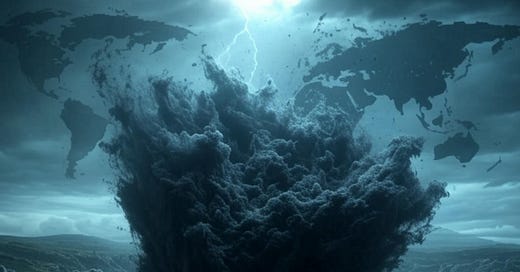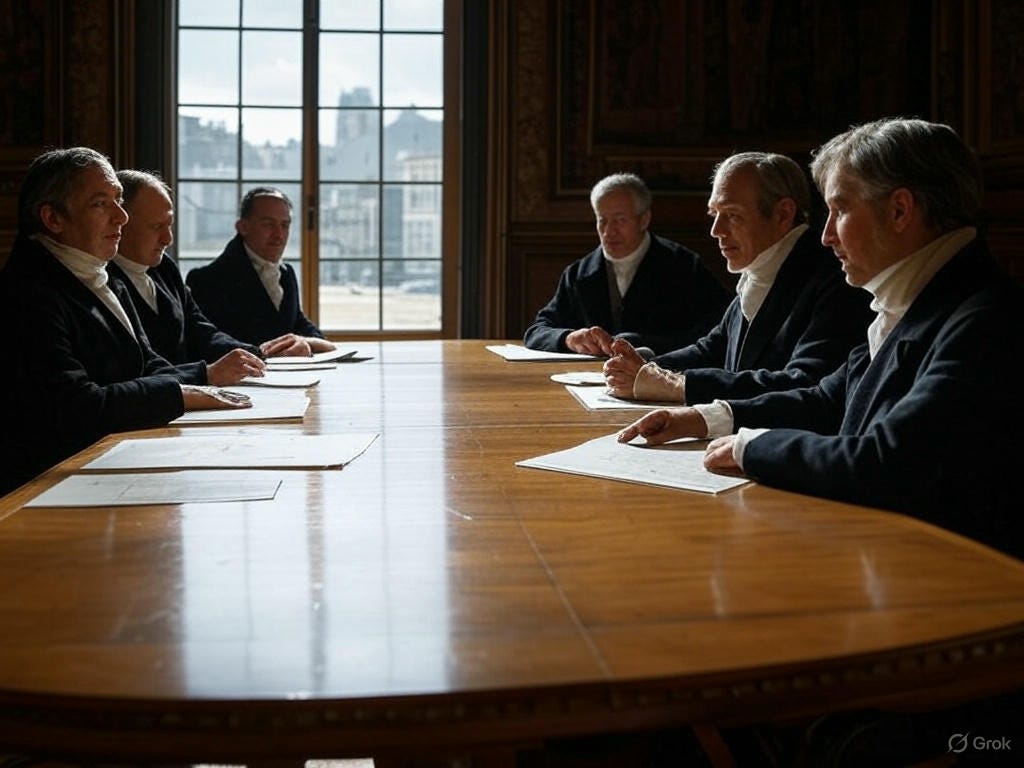Mr. Trump has now given us six weeks of rapid-fire rule by executive order and Canada has finally appointed, with votes surprisingly and suspiciously distributed in remarkably similar proportions across the fruited plain, a new Prime Minister. Of course the relevancy of our new prime minister, for the purposes of what follows, resides only in the fact that he shares my citizenship - I think. Holding three passports, one wonders where his citizenship lies.
In any event, economic and geopolitical patterns are starting to emerge from the chaos of Mr. Trump’s early days of rule. If my reading of the patterns is correct, then we are in prime worldview observation territory. Being old and preternaturally accustomed to being wrong, I have more than enough temerity to embark on a three-essay series to explain what I think is going on from a worldview perspective.
This first is to define the broad layout of the current economic and geopolitical space, identify the sources that have influenced my thinking and give some hints as to what may lie in the future. I will then write more specifically about, first, the economic implications and outlook and then, second, about the geopolitical implications and outlook. None of what follows should be construed as investing advice and the best that can be said for these thoughts is that they might be interesting even as they are undoubtedly wrong. Forewarned and all that. And thanks to Grok for the pictures.
In 1979, my wife and I sold our first house and made a fifty percent gain in the two years that we owned it. I thought I was a genius and that making money was obviously “my thing”. I should have listened to my wife. She did her best to moderate my “enthusiasm” and, as it turns out, has much better investing instincts than I. Unfortunately, I also bought a book on investing and trusted the recommendations that it offered. In 1982, I owned another house, three hundred ounces of gold futures and a small apartment building that was being converted to a strata association. I also owned an impressive pile of bank debt; leveraging my way to billions.
In rapid succession my gold futures went from $800 per ounce to under $400 per ounce. I managed to get out at just over $500 per ounce which meant my investment was lost but I didn’t have to declare bankruptcy. The mortgage on the apartment building went from ten percent to twenty four percent and my banker, to protect his investment in a large, nearby condo development decided to replace the bankrupt owner, finish the condos and rent them at very attractive rates. All my tenants took advantage of his offer. My banker and I had a very healthy (= loud) discussion about the perversity of his obviously dubious character.
In 1982, Alberta was pummeled by Trudeau Pere (Justin’s horrible father) and the economy tanked due to government policy. House prices dropped and many of my friends lost all the equity in their homes and so gave the house keys to the bank. A few relatives lost their businesses due to the abrupt nature of the slowdown. This came on top of the decision by Ronald Reagan and Paul Volcker to shock the moribund, stagflationary economy of the 1970s by driving interest rates to twenty four percent. I wish they had asked my views first.
The point of this sad retelling is not to elicit sympathy, although that too would be nice, but to point out that timing is everything and I have never quite gotten the hang of timing. What is happening to the North American economy today is similar to the early 1980s, I think, in terms of paradigm shifting. The details of the shift are different, but the impacts might be similar.
In the 1970s, the North American economy was locked in a repeating psychological loop called rational expectations and the only way out was a powerful, psychological hammer blow. Today we are in a similar psychological loop demanding an equally painful hammer blow. The current economy has been “juiced” with outrageously loose monetary controls resulting in the cost of money going to near zero. When the pandemic fear mongering of 2020 ended, the US and Canadian governments ramped up spending to deliver an economic sugar high. The long-anticipated inflation finally struck in 2021, interest rates spiked, and now the breathtaking deficit spending of the past ten years threatens to destroy the world financial system – again.
This time, with luck, the people who created today’s problems will not be able to profit from their cupidity and stupidity as they did after 2008. In the past fifteen years, easy money floated the stock market and your investment accounts did very well. If you didn’t have investment accounts, you did very… well, not so well. In fact, today those without investment accounts can hardly afford to rent, much less own a house and life is mostly paycheque to paycheque. This may be about to change.
Following the market crash of 2008, two phenomena of great interest to me, arose from the consequential ashes of that egregiously covetous period. The first was the Tea Party movement in the United States and the second was Andrew Breitbart. The first phenomenon was crushed by the mendacity of the US two-party political system and the other ended with the untimely death of Mr. Breitbart. The after shocks of both these phenomena, however, resulted in an intellectual resurrection in the form of Steve Bannon and the MAGA movement that unexpectedly brought Mr. Trump to power in 2016.
In the aftermath of the 2020 American election and, following the events of January 6, 2021, I began to listen, slavishly as it turned out, to Mr. Bannon’s Warroom podcast. Through him I became acquainted with two influential books; “The Fourth Turning: What the Cycles of History tell us about America” and “The Lords of Easy Money”. Both are foundational to my current thinking. The Warroom also introduced me to Scott Bessent and Edward Dowd, who are, in my view, two of the deepest thinkers on the psychological nature of economies.
Whatever one might think of Steve Bannon, his Warroom podcast is a tour de force. Every book that was promoted on the program immediately went straight to “bestseller” status. The program has remarkable reach and influence. When Bannon stated in early 2021 that Donald Trump would return and win the 2024 election, I believed him. When my training in economics screamed from 2010 until 2020 that inflation must come – and didn’t – I had Bannon and his guests to explain that Adam Smith and David Ricardo were not letting me down.
It turns out that the bizarro world of Modern Monetary Theory was just a repeat of John Law and the Banque Royale fiasco of 1718. It turns out that Ricardo’s axioms from 1809 are still correct. It turns out that we are sitting ringside to one of the most interesting economic periods of recorded history. As Ronald Reagan brought twenty years of economic strength in the early 1980s so too, if I am correct, will Mr. Trump via Scott Bessent, bring us decades of balanced economic growth starting in a year or two. It is getting to the lift-off point that will cause us to dine on our fingernails.
It also turns out that we are sitting ringside to one of the most fascinating shifts in geopolitical alignment of the past three hundred years. We are effectively seated at a Versailles table and the year might be 1815. Look around at the players and see if you can spot Talleyrand or Metternich or Castlereagh. Sadly, they haven’t shown up yet. But keep watching because,
“The moment maketh the man”.
Mr. Zelensky would do well to do some reading on these statesmen rather than believing himself to be the new Churchill. He isn’t and never will be. But if he is as clever a statesman as Talleyrand, he may yet pull the Ukrainian fat out of the fire. I am doubtful but still hopeful.
Nevertheless, the old will give way to the new as the disastrous unipolar world of the American neocon elite will soon birth a multipolar world of balanced spheres of influence. It might look like a reinvigoration of the 19th century Concert of Europe complete with its flexible diplomacy and “pop-up” problem solving. Or it might resemble the world-at-war of Orwell’s’ 1984. There is risk in everything.
A world with the United States as “policeman” may have been a worthy experiment. But the experiment began to play with “gain of function” resulting in every diplomatic solution requiring the dropping of many bombs and creating chaos and destruction around the world. Should the US be given a mulligan and re-do? Other than the neocon Arcelor elites who authored the mess, no one wants to revisit their Frankensteinian experiment.
Am I reading too much into the power of worldview in what I predict will be a history packed decade? Worldview drives individual and corporate psychology. Surely, we have learned that lesson from the covid experience. Just as worldview drives psychology so does psychology drive economies and geopolitics. It is a straight line. Of course, nothing can be predicted with certainty and as always, “there is many a slip between cup and lip”, but the indeterminacy of the slips is as interesting as the anticipation of the sips.
Next time I will look in more depth at the potential economic changes.






Meanwhile the Wetiko Psychosis is now dramatizing its terminal phase:
http://www.awakeninthedream.com/undreaming-wetiko-introduction